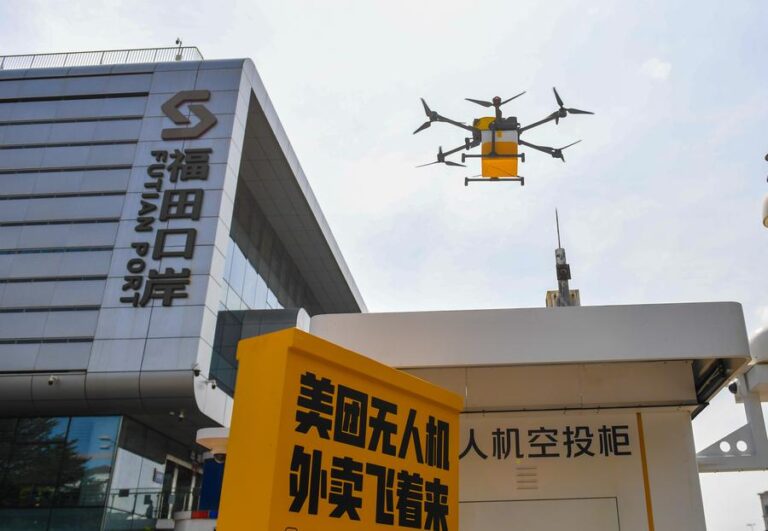NANNING, June 21 (Xinhua) — In the charming countryside of south China’s Guangxi Zhuang Autonomous Region, Alex Turner, a British expat, made a few taps on his phone as he hobbled back to his guesthouse, careful not to knock the toe he had just hurt while out for a hike. In just 30 minutes, a sealed yellow paper bag arrived at his doorstep.
“I bought a nail clipper and some first-aid stuff to deal with the injury,” said Turner. “And I also bundled some dental floss and mosquito repellent for a bigger discount.”
This prompt service epitomizes China’s rapidly growing instant retail sector. E-commerce giants like Alibaba, JD.com, and Meituan have all placed significant bets on a new model centered around the concept of “everything can be delivered within 30 minutes.” As more and more consumers in China turn to smartphone apps for everything from groceries to medical supplies, instant, or “flash,” delivery has become a game-changer to daily life.
A recent report by MoonFox Data, a leading Chinese data insights provider, shows that China’s instant retail sector reached 780 billion yuan (about 108.8 billion U.S. dollars) in 2024 and is projected to exceed 2 trillion yuan by 2030. Platforms run by Alibaba, JD.com and Meituan are fueling this growth by catering to consumers’ increasing demand for instant gratification.
“Today’s consumers prioritize speed and accessibility above all,” said Zhao Feng, dean of the school of business administration at Guangxi University of Finance and Economics. “The promise of half-hour delivery is not just a marketing ploy — it’s a game-changer. It taps into consumers’ desire for convenience, reduces the hassle of shopping, encourages impulse buying, and ultimately drives up overall spending.”
A study by consultancy firm Accenture shows that over half of consumers born after 1995 expect same-day delivery for their purchases and are more willing to pay a premium for faster shipping.
For Li Wei, a personal trainer in Nanning, Guangxi’s capital city, the speed of instant retail eliminates the need to plan ahead.
“I don’t have to stock up on toilet paper, snacks or energy drinks anymore,” said Li. “With a few clicks on my phone, the groceries will be here before I can second-guess myself.”
The appeal extends beyond on-demand convenience as many cost-conscious shoppers chase discounts and enjoy the thrill of snagging a deal.
“Sometimes, it goes beyond the convenience,” said Zhang Chaozhen, a postgraduate student at Guangxi University as she scrolled through an app during her lunch break, hunting for the steepest discounts on a skincare product. “It’s about getting a deal and feeling smart about it.”
Behind the scenes, the explosive wave of instant retail is reshaping supply chain logistics, fostering a deeper connection between online platforms and brick-and-mortar stores.
Unlike traditional e-commerce, which typically depends on a few centralized warehouses, instant retail platforms utilize advanced AI to connect hundreds of local stores with a vast network of strategically placed, highly automated micro-warehouses.
These facilities are designed to process retailer orders efficiently, expedite inventory shipment, and prevent the accumulation of excess “wrong” products in stores, according to Zhou Yimu, an industry insider and brand manager of Guishuangbai, a local convenience store chain in Guangxi.
In late May, Alibaba reported that its flash delivery platform has logged a daily order volume exceeding 40 million in less than one month since its official launch.
The model of instant retail unleashes a “triple wins” dynamic as the digital platforms gain access to a vast network of inventory, retailers boost sales through online channels, and consumers enjoy faster delivery and broader product selections, said Liu Yuanshuai with Chaoyigou, a supermarket chain that specializes in instant retail business in Guangxi.
“Partnering with those instant retail platforms has been the revenue booster,” said Tao Zhaogui, a manager at a chain pharmacy in Nanning. “Before, we largely relied on walk-in customers, but now, with the round-the-clock access to online prescriptions, our online orders have increased by 41 percent year on year.”
However, the rapid growth of the sector has also raised concerns about consumer rights. Some platforms are accused of exploiting big data to engage in “discriminatory pricing,” adjusting prices based on individual consumers’ purchase histories, according to Tang Yating, a lawyer specializing in civil and commercial law. Additionally, after-sales services often fall short, with cumbersome return and exchange policies that remain unresolved. There is also a tendency for platforms and sellers to shirk responsibility.
“Stronger oversight is the key,” said Tang. “Clear regulations must safeguard consumer interests within this rapidly evolving sector by ensuring transparency and accountability in pricing and service.” ■

